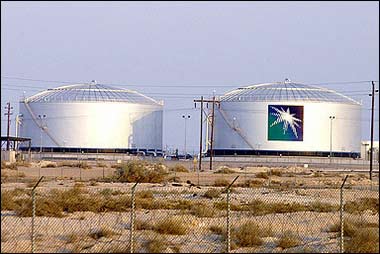|
Al-Qaida vows attacks after Saudi oil raid
(Associated Press )
Updated: 2006-02-26 11:01 The authenticity of the statements could not be independently confirmed.
Crude oil prices jumped by more than $2 a barrel on world markets after the
attack. But Saudi Oil Minister Ali Naimi swiftly issued assurances that the
violence did not affect oil operations.

Two oil reservoirs
at the oil processing plant of the Saudi state oil giant Aram, in Abqaiq.
The Saudi branch of the Al-Qaeda network vowed to carry out more attacks
on Saudi oil installations, according to an Internet statement posted.
[AFP] |
On Saturday he stressed to U.S. Commerce Secretary Carlos Gutierrez at a
meeting in Riyadh that the kingdom would "ensure the flow of oil despite the
terrorist threats."
Al-Qaida militants launched a campaign of violence in Saudi Arabia — bin
Laden's birthplace — in 2003. Attacks on oil infrastructure could represent a
new tactic.
Previous targets were peripherally related to the oil industry — expatriate
oil workers living and working in the kingdom. Bin Laden first called for
attacks on oil facilities in December 2004.
Analysts and diplomats said Friday's events were proof that increased
security at oil installations has paid off for the Saudi kingdom.
"It's a success story," said Fareed Mohamedi, head of country analysis at
Washington-based PFC Energy. "It's a bit too close for comfort, but it certainly
shows that they can repel these types of attacks."
Mohamedi said the Saudi government typically places remote sensors in the
desert surrounding oil complexes and several fences around the facilities
themselves. About 25,000 security personnel man checkpoints on roads leading to
the facilities and gates into the compounds.
Saudi security forces have largely had al-Qaida's branch in the kingdom on
the run over the past year, arresting hundreds of suspects. They killed or
captured all but one of the top 26 militants on a most-wanted list issued in
December 2003, then did the same with 10 of the 15 on a second list issued in
June.
Friday's attack was the first major strike since December 2004, when five
gunmen attacked the U.S. Consulate in the Saudi port city of Jiddah. Five
consulate employees from the Middle East and Asia and four attackers were
killed. Ten people were wounded.
Analysts said it was too early to say if the Abqaiq bombing signaled a new,
aggressive campaign. But the choice of oil facilities should increase concerns,
they said.
"If the Saudi system goes down, then you will have a real problem, and for
oil prices the sky is the limit," Mohamedi said. "You're attacking the absolute
heart of the world oil system."
Saudi Arabia holds over 260 billion barrels of proven oil reserves, a quarter
of the world's total. It currently puts out about 9.5 million barrels per day,
or 11 percent of global consumption.
|